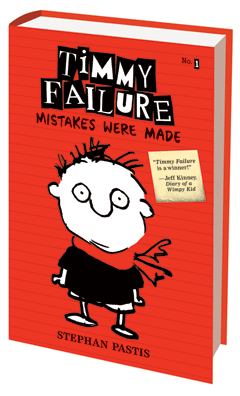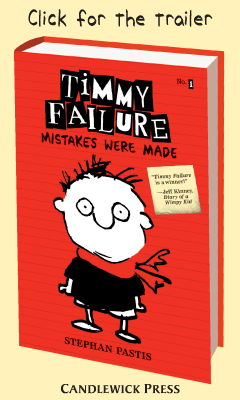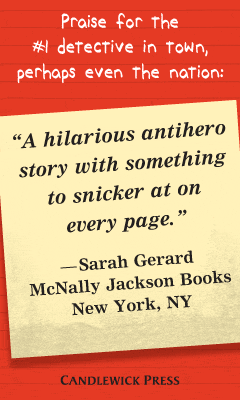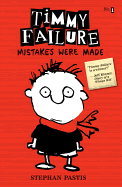Timmy Failure: Mistakes Were Made
by Stephan Pastis
Readers will quickly take to Timmy Failure, an unreliable narrator to stand alongside such antiheroes as Charlie Brown and Greg Heffley.
Timmy's passion is detective work, and his sidekick is a 1,500-pound polar bear named Total. Together they tackle such mysteries as classmate Gunnar's missing Halloween candy, the death of Max Hodges's hamster, and the TP'd trees at the Webers' home. As Timmy overlooks vital clues, and sees what he wants to see, readers will find the humor in his miscues. But there are also touching moments between Timmy and his mother, who's raising her son solo, and between Timmy and Total. The comical dynamic between Timmy and high-achieving Rollo Tookus is one of the highlights of the book. Timmy's teacher groups him with the smart kids (including Rollo) in an effort to improve the boy's performance, but Timmy instead changes their answers, resulting in a group score of zero. As a result, Rollo's anxiety turns him into a bobblehead at the prospect of any group test, but also camouflages the fact that he comes through when Timmy really needs him.
Stephan Pastis, the creator of the comic strip Pearls Before Swine, here makes his children's book debut, liberally illustrating the novel with images of a wide-eyed hero and his supporting cast. (Timmy naturally claims authorship of the book and credit for the pen-and-inks.) Initially, Timmy's mother appears only as the index finger of authority, letting her son know when he may borrow her Segway: "Never. Ever. Ever," says the dialogue balloon belonging to the wagging finger. Timmy, however, "thought that was vague," so he rides what he calls the "Failuremobile" without her knowledge. The Failuremobile goes missing a dozen chapters in, however, and it's unfortunate on a number of levels. "[W]hen you're a detective, you cannot be the victim of an unsolved crime," Timmy says. "It is like a dentist with missing teeth. Or a gardener with dead flowers. And dead is what I will be if my mother finds out the Failuremobile is gone." Timmy suspects the girl whose face he obscures in his artwork, referred to as "the One Whose Name Shall Not Be Uttered" (a nod to Harry Potter's nemesis). It's Rollo who finally speaks her name: Corrina Corrina, their classmate and Timmy's rival detective.
Some children may question whether or not Total is real. But Total is real to Timmy ("Two against the world," Timmy calls them, alongside a poignant picture of the duo walking into the sunset), and that is what matters most. Pastis also leaves evidence that other adults look out for Timmy in addition to his mother, such as Flo the librarian, Dondi the yard lady (who gives Timmy Rice Krispies Treats for Total at recess) and, eventually, Mr. Jenkins, "the New Guy," who figures out how to teach Timmy a few things. One classmate, Molly Moskins (with "bizarrely mismatched pupils" and smelling of tangerine), has a crush on Timmy, which Rollo points out to the narrator, but which Timmy denies. Timmy's mother becomes more fully formed in both the boy's narrative and in his pictures as his schoolwork suffers and she gets more involved. In one of the most moving chapters, Timmy assures his mother that income from his detective agency, Total Failure, Inc., will easily help pay their bills, which come to $1,485.23. A secondary story line involving his mother dating a "bowling turkey" named Crispin also underscores the closeness between mother and son. As much as Timmy purports to be independent of both his mother and Rollo, they are the only two to whom he admits, "Mistakes were made"--his form of an apology. Eventually, Timmy does solve all his mysteries, to his own satisfaction, while also leaving readers with the understanding that he still has some growing up to do.
Pastis tucks into his chapter heads some fun puns for adults (e.g., "A Change Is Gonna Come"; "No Teacher Left Behind"; and "Happiness Is Not a Dumb Blanket," a riff on Linus's quote in the animated Peanuts film Happiness Is a Warm Blanket, Charlie Brown, on which Pastis was a co-author). No matter how often Timmy may seem in the dark, we never doubt Pastis's compassion for his protagonist, nor his mother's love for Timmy. Readers will be eager to welcome Timmy back in his next adventure, and cheer on the success of Total Failure, Inc. --Jennifer M. Brown








